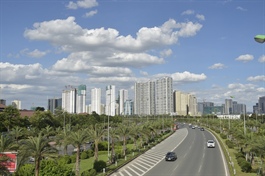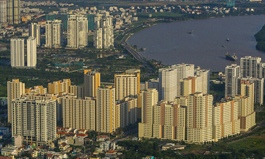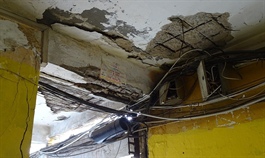Legal move supports realty market development in 2021
Legal move supports realty market development in 2021
Vigorous legal changes regarding real estate investment and construction are set to beef up the realty market in the Year of the Buffalo.

More than 4,000 shop houses will be released in Ho Chi Minh City in 2021
|
The prime minister has just greenlit an economic security project on housing and real estate aimed at ensuring social well-being and helping the market to develop sustainably.
According to Ha Quang Hung, deputy head of the Housing and Real Estate Market Management Department under the Ministry of Construction, many policies regulating housing and real estate market growth have been improved and aligned with the current regulatory system on investment, construction, and doing business.
Significantly, the Law on Construction 2020 has been united with the Law on Housing, Law on Real Estate Business, and the Law on Environmental Protection regarding investment proposal approval, investor approval, or developer recognition, creating a healthier and more transparent investment environment while mitigating speculation and price manipulation activities.
“In 2020, despite the impacts of COVID-19, the real estate market still managed fair growth of about 8-11 per cent, if indirect factors like capital, land, and building materials were taken into account,” said Hung.
|
"The success of the 13th National Party Congress would bring vitality to the whole economy, particularly the real estate, especially in Ho Chi Minh City and Hanoi – Vietnam’s two growth engines." Su Ngoc Khuong Senior director of Investment, Savills Vietnam |
Le Hoang Chau, chairman of the Ho Chi Minh City Real Estate Association opined that several revised laws (Law on Investment, Law on Securities Business, and Law on Enterprises) coming into force from January 2021 have bolstered market growth.
“The realty market has undergone the most difficult period and will gradually rebound. Positive legal changes would motivate firms to join the affordable housing and mid-level segments more robustly,” he said.
From another angle, Su Ngoc Khuong, senior director at Savills Vietnam, a leading real estate consultancy firm, noted that the success of the 13th National Party Congress would bring vitality to the whole economy, particularly the real estate, especially in Ho Chi Minh City and Hanoi – Vietnam’s two growth engines.
The new "city in city" urban form of in Ho Chi Minh City is deemed an inspiring breakthrough, whereas in Hanoi transport infrastructure has witnessed noteworthy improvements.
In addition, experts assumed that fiscal and monetary policies in the past decade have proven successful, with well-controlled interest rates.
Nguyen Van Dinh, deputy general secretary of the Vietnam Real Estate Association (VNREA), outlined two scenarios for market development in 2021.
In the first scenario, with the mindset “cash is king” lingering in the first and second quarter of 2021, the market will be full of challenges due to low transaction volumes. COVID-19 will only be contained by the middle or the end of the first quarter with no new infections reported, allowing the market to gradually rebound.
In the second scenario, the pandemic would drag on to be contained no sooner than June. In this scenario difficulties would continue mounting. Accordingly, housing prices in the primary market are expected to shed an average 5 per cent compared to last year, with sales volumes taking a plunge.
For commercial real estate, the lingering pandemic would lower operation efficiency as well as occupancy rates, while resort real estate would remain in “hibernation” the way it was in early 2021.
The latest report by Colliers International Vietnam forecast that more than 4,000 shop houses would be released in the Ho Chi Minh City market in 2021. The birth of Thu Duc City would fuel the development in the city’s northeast. Colliers data also show that products from six projects in Thu Duc, Binh Chanh, and Nha Be districts will enrich supply in the upcoming time.




























